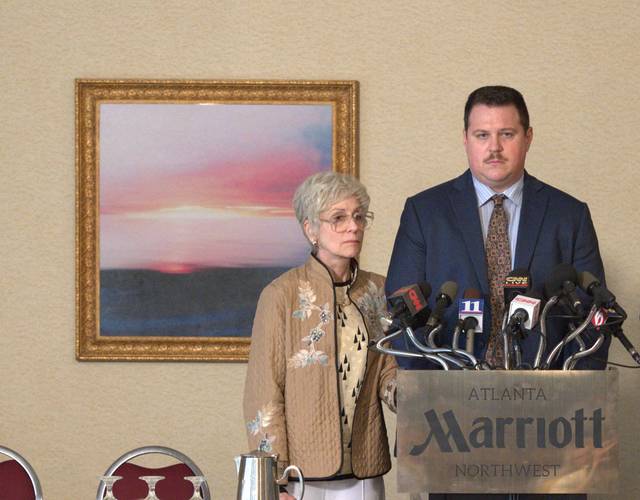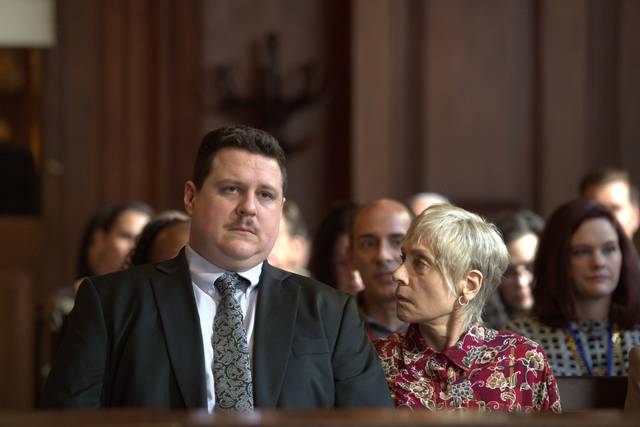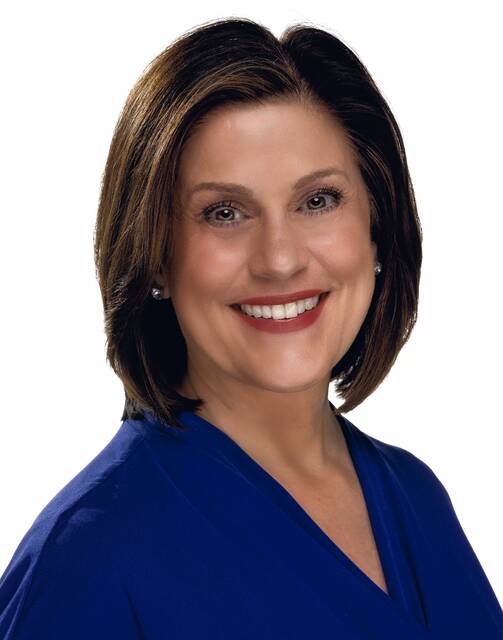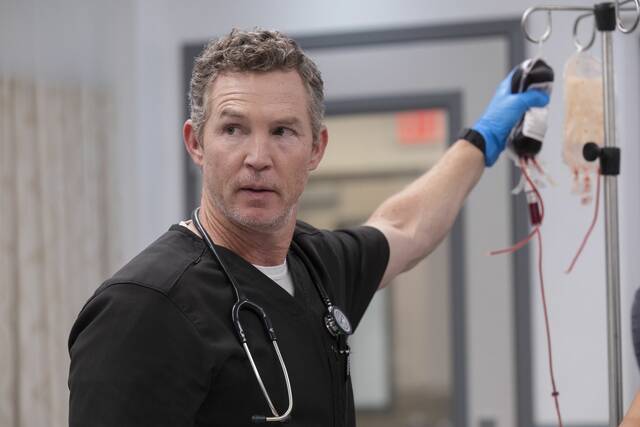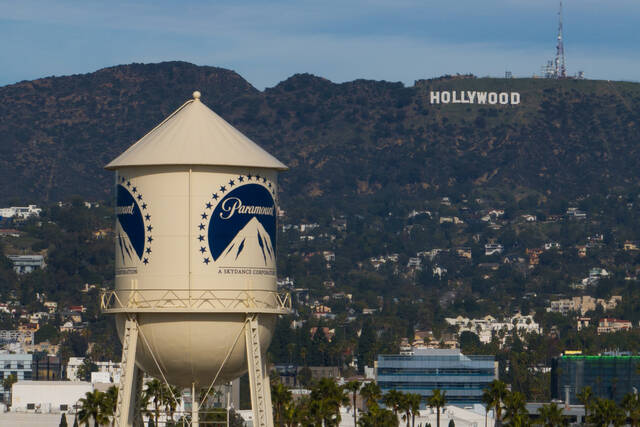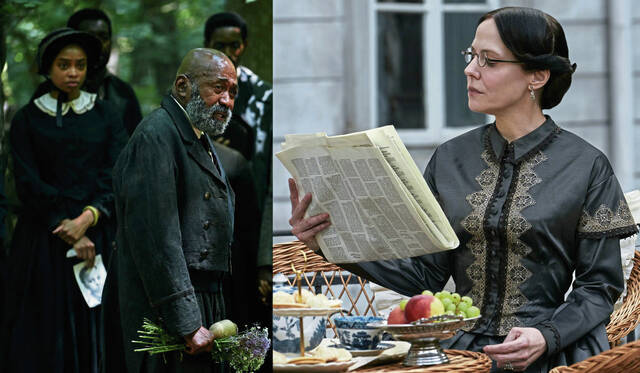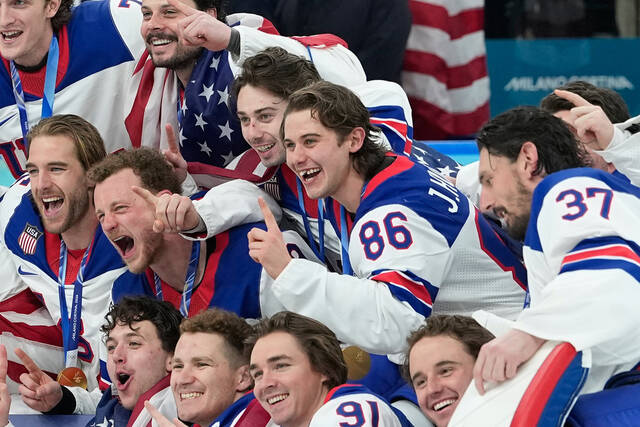It’s a round-about way that “Manhunt: Deadly Games” came to film in Pittsburgh.
The show’s first season, Discovery Channel’s “Manhunt: Unabomber,” was set to shoot in Western Pennsylvania in 2016 but initially couldn’t find a male lead. Once producers lined up a cast, there were no more Pennsylvania film tax credit funds available and the production relocated to Atlanta.
Season two, “Manhunt: Deadly Games” (10 p.m. Monday, CBS), is set in Atlanta as it chronicles the July 1996 Centennial Olympic Park bombing, but filmed its 10 episodes in Pittsburgh from June to October 2019.
Series creator/writer/executive producer Andrew Sodroski said producers failed to find the “texture and grit and variety” when filming season one in Atlanta. For season two, choosing Pittsburgh was also more practical: They needed nearby woods.
“Deadly Games” director/executive producer Michael Dinner shot the pilot for FX’s “Justified” in Western Pennsylvania in 2009 before that program relocated to film the rest of its episodes in Los Angeles. (“Justified” series regular Nick Searcy has a recurring role in “Deadly Games.”)
“I called Andrew and said, are you locked into Atlanta? Because for a lot of reasons, I don’t think we should do that,” Dinner recalled in a January interview during the Television Critics Association winter 2020 press tour. Dinner was shooting another project in Atlanta and realized the Centennial Olympic Park of 2019 did not resemble the 1996 version.
“Whatever we do, we have to reconstruct the park,” Dinner said. “And while the story starts at that moment in time with the bombing, the story is taking us into the woods.”
A forest at the Jewish Community Center’s Henry Kaufmann Family Park in Monroeville, which housed the exterior sets of two-season WGN America series “Outsiders,” was used for “Deadly Games” — some “Outsiders” sets were recycled for this production — along with woods at McConnell’s Mill State Park in Lawrence County.
“Manhunt: Deadly Games,” which first aired earlier this year on Spectrum Originals (unavailable in Western Pennsylvania), tells the story of the bombing and wrongly accused security guard Richard Jewell (Cameron Britton), who quickly goes from hero to prime suspect while the real bomber, Eric Rudolph (Jack Huston), sets off more bombs.
Viewers who enjoyed the first season of “Manhunt” on Discovery will likely appreciate this season, too, which delivers a stronger, more complex story.
In addition to following Jewell, “Deadly Games” branches out to include storylines about the media via an Atlanta newspaper reporter (Carla Gugino), arrogant FBI leaders, Rudolph’s bombing spree and a composite bomb expert character (Arliss Howard) who serves as an audience entry point and the show’s most straight-up hero. (Former WPXI-TV anchor/reporter Jodine Costanzo can be spotted playing a reporter in an episode toward the end of the season.)
Episodes build to a cliffhanger each week, ensuring viewers will want to come back to see where the story goes next, which in some cases (self-mutilation in episode five) seems too crazy to be true but turns out to be what happened. Other plot twists, particularly in the back half of the season, meander away from reality. Of the 10 hours, “Deadly Games” fills about seven hours well using actual events before resorting to embellishment. Producers also manipulate the timeline of the actual events, presumably to create more dramatic impact.
“Deadly Games” tracks Jewell and his relationship with his mother, Bobi, played by Judith Light, a 1970 graduate of Carnegie Mellon University’s drama program who’d never before filmed in Pittsburgh. (Britton played serial killer Ed Kemper on Netflix’s filmed-in-Pittsburgh “Mindhunter.”)
“You can’t have a story like this without looking at the depth of humanity and what people long for,” Light said in January. “[Richard Jewell] wanted to be the savior. He wanted to be there for people. And in truth he was.”
Cameron said some people he’s talked to still believe Jewell was guilty of the Atlanta Olympics bombing because after Rudolph was discovered to be the real bomber, the media and law enforcement moved on.
“That was the strangest, surrealist part for these folks,” Britton said. “This isn’t someone who’s looking for fame in any capacity. I know folks who’ve been looking for fame and found it and hated it. These folks didn’t even want it and it was thrust upon them.”
Although the show’s production base was at 31st Street Studios in the Strip, to recreate Atlanta’s Centennial Olympic Park, “Deadly Games” used space at Tech One Business Park in Monroeville.
“We had to add the [Atlanta] skyline” via visual effects, Dinner said.
Other Western Pennsylvania locations used include the old Blawnox post office building (as a FBI command center), Allegheny Courthouse (as Atlanta City Hall’s rotunda), Grieco’s Carefree Inn in Indianola (as an Applebee’s) and Ventana Hills Apartments in Coraopolis (as the exterior of Richard Jewell’s apartment).
Kittanning, where Dinner shot scenes for the “Justified” pilot, plays Murphy, N.C., in “Deadly Games,” which was originally titled “Manhunt: Lone Wolf” (it’s based on the 2006 Maryanne Vollers book “Lone Wolf: Eric Rudolph: Murder, Myth and the Pursuit of an American Outlaw”).
“ ‘Lone Wolf’ does not play well internationally [as a title],” Sodroski said. “So [production company] Lionsgate decided they wanted something that would be better for an international audience.”
Jewell’s story was told in the 2019 Clint Eastwood film “Richard Jewell” with actor Paul Walter Hauser in the title role. Dinner said a TV series can better capture the characters, making them more three-dimensional than a 110-minute movie.
“The Richard Jewell movie is just about Richard Jewell,” Sodroski added. “Our show incorporates that story but this is a huge, huge canvas. We don’t stretch the Richard Jewell story out for eight hours. We’re telling an enormous story about the largest fugitive manhunt in American history.”
Britton said it was important for “Deadly Games” to shine a light on the disconnect between Rudolph’s movie star good looks and the murderous acts he committed versus Richard Jewell’s frumpy look that may have played a part in unfair accusations against him.
“[Rudolph] hates law enforcement and everyone admires and respects him,” Britton said. “And then at the other end of this, here’s an actually good person who idealizes law enforcement — without the jaw line, without the witty banter – and nobody thinks much of him, and I think those are important stories to tell. It’s important to remind folks what a hero actually is.”
Another lesson Britton took from the story: When you make a mistake, acknowledge it and apologize. The FBI cleared Jewell in a letter sent to him in October 1996 but it did not include an apology. Then-U.S. Attorney General Janet Reno expressed personal regret in July 1997.
“They were so embarrassed by how they treated him because they were willing to do anything to get their man, and they weren’t willing to own up to it,” Britton said in January prior to this summer’s protests against police brutality. “To me, that rift between the civilians of America and law enforcement, it’s because they don’t treat themselves as humans who make mistakes. That’s how you end up in situations like this where we feel as civilians ourselves that we need to exonerate other folks.”


